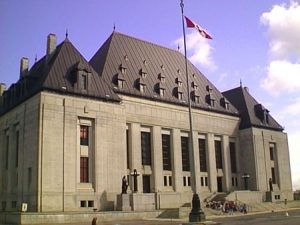The Supreme Court of Canada has given the Liberal government until June 6 to amend the Criminal Code so that “physician-assisted death” is legal in specified circumstances. Yet some Senate members have threatened to delay the amendment’s passage. While this looks like a potential contempt of court, some of the senators might argue that it is the House of Commons, or at least those MPs who seek to pass the existing bill into law, acting contemptuously toward the high court’s order.
Given that the government has promised a free vote on the bill, no Liberal “whipping” is possible. Whipping wouldn’t  help in any event. When the Liberals sat in opposition, leader Justin Trudeau extravagantly (if fecklessly) cocked a snook at the Senate as a poor man’s House of Lords (packed by successive governments with their toadies and bagpersons) by transubstantiating Liberal senators into Independents outside his control. In any event, the so-called Liberal leader in the upper chamber, James Cowan, told the Globe and Mail that Bill C-14 does not reflect the Supreme Court’s criteria – that the procedure could be granted to “a competent adult person who (1) clearly consents to the termination of life and (2) has a grievous and irremediable medical condition … that causes enduring suffering that is intolerable to the individual in the circumstances of his or her condition.”
help in any event. When the Liberals sat in opposition, leader Justin Trudeau extravagantly (if fecklessly) cocked a snook at the Senate as a poor man’s House of Lords (packed by successive governments with their toadies and bagpersons) by transubstantiating Liberal senators into Independents outside his control. In any event, the so-called Liberal leader in the upper chamber, James Cowan, told the Globe and Mail that Bill C-14 does not reflect the Supreme Court’s criteria – that the procedure could be granted to “a competent adult person who (1) clearly consents to the termination of life and (2) has a grievous and irremediable medical condition … that causes enduring suffering that is intolerable to the individual in the circumstances of his or her condition.”
The bill requires that applicants for such procedures be 18, that their death be “reasonably foreseeable,” and that their request for assistance be in writing. Two medical practitioners must certify that the medical condition meets the bill’s criteria.
Senator Cowan believes the bill is overly restrictive, particularly because it excludes too many possible applicants, and because “reasonably foreseeable” is imprecise. (He served on the parliamentary committee appointed by the government to advise on how the bill should be drafted. The recommendations suggested that people in the early, “competent” stages of mental impairment be permitted to request medically-induced death should they decline to a certain point, and that in certain instances of extreme suffering such assistance should be available to minors.) While he told the Globe’s Laura Stone that “it’s not the end of the world if the bill doesn’t pass” by June 6, he could argue that, insofar as it does not substantially track the court’s ruling (in his view), it would be the Commons in breach of the deadline order.
It is of course a grave matter, fundamentally unconstitutional and a threat to the rule of law, for Parliament to snub the nation’s highest court. Should the delay be caused by unelected senators frustrating the will of legislators chosen by the electorate, the insult is yet graver. But if the deadline passes without legislation in place, no matter which house might be said to commit the contempt, the problem is sanction. The high court possesses inherent power to punish for such offences (by sundry means, including fines and imprisonment), but in this case, to punish whom? The parliamentarians who actively delay the bill? The entire Senate or Commons? Both houses? How?
Lawmakers are not above the law, and the court already has extended the deadline for them once (by six months, after a change in government). Directors and officers are liable for contempts by their corporations, as are union leaders where the contempts are organized. Arguably, house leaders, including cabinet ministers and prime ministers, could be liable for contempts if disobedience of court orders is party policy, more or less. (Where the contempt is clearly by individual choice, the courts do not act against the collective.) If Parliament misses this second deadline, we probably won’t see Cowan or the PM dining on Her Majesty’s jailhouse bologna until they “purge their contempt.” But what message would this delinquency send about the rule of law – among those meant to give it life and husband it?

